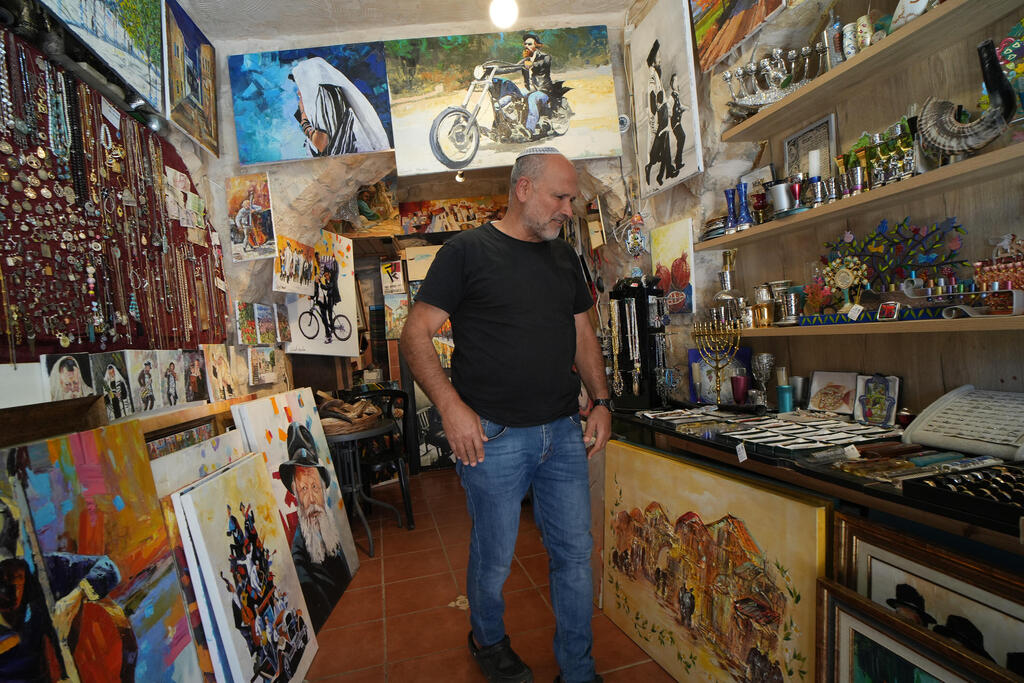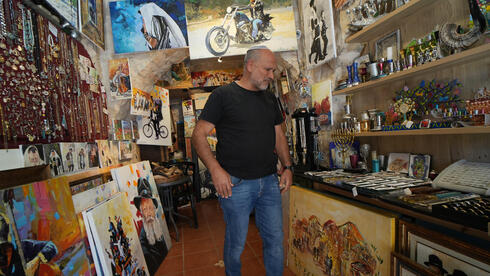As the war continues and tourism declines following the COVID-19 pandemic, one of Israel’s holiest cities remains deserted. Safed was beginning to recover economically after COVID-19, but Hezbollah rocket attacks drove tourism and commerce out of the city without compensation from the government.
2 View Gallery


Shimon Peretz and his vacant storefront
(Photo: Effie Chalil)
Every morning for the past eight months, Shimon Peretz opens his Jewish gallery in the heart of Safed’s Old City market, dusts off his artworks and waits for customers. After about two hours, he stands up, adjusts his clothes, closes his book, and leaves the shop without anyone coming in.
“I’ve been in the gallery for 15 years and I’ve never seen anything like this,” he said. “During the pandemic, I barely worked for almost two years, but I received compensation. Now we’re not being acknowledged as being in poverty, and the government is saying that the lack of tourists and travelers is not their problem.”
Shops in Safed remain closed due to a decline in customers and tourists, and shopkeepers posted signs that read, “We regret to inform you of the untimely demise of tourism and commerce in Safed, a city that has been abandoned on the battlefield by the State of Israel and the Municipality of Safed since the time of COVID-19 until the present.”
Safed’s new mayor, Yossi Kacon, is fighting for government compensation for affected businesses and individuals. He recently succeeded in securing compensation for the city’s guesthouses and hotels, but this did not include restaurants and galleries, which have also been affected by the decline in tourists.
“These businesses obviously depend on tourism and it is inconceivable that they would not be included in the plan. We are fighting for them,” Kacon told Ynet.
“Luckily, I own the property for my business,” Peretz said. “My only expenses are property taxes and electricity. I have a business here that pays rent even with losses of 20,000 to 30,000 shekels a month.” Last month, he made just 3,000 shekels from a few tourists. “Before, I could make 40,000 to 60,000 shekels,” he said. “We hope that the government will compensate us when they do.”
The Canaan Gallery in Safed’s Old City is also closed. As I enter the courtyard, Shalom Elad appears from the second floor. He has worked in an old textile factory here for five years, making exquisite prayer shawls and scarves, whose items cost between $900 and $1,600.
“Can you hear this silence? It’s a sound I’ve been hearing for the last eight months,” he says. “Sometimes I hear sirens from Melon and I run up to the roof to photograph it. In some seasons, we have a 300-metre gallery and it gets so crowded that you can’t move. Now everything is deserted. Most of the shops here are closed.”
After war broke out, Elad took a break from work for a while but then returned to the factory. “The owner of the factory decided to keep me on because if the factory closed it would be a victory for the enemy,” he explained. He said the factory’s income, which weaves prayer shawls, fell by 95 percent.
“We are fortunate to have customers from all over the world who place orders with us online,” he said. “We emailed them and asked them to help us find new customers to survive until the situation improves.”

